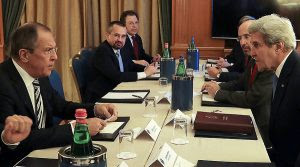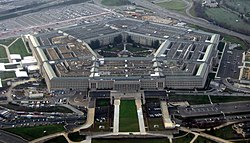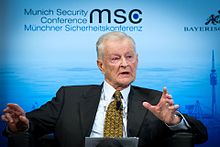
(Baltimoresun.com)
In what turned into a major shock for most Americans, Hillary Clinton lost an election that was all but buttoned up – at least, according to all the major media pundits and most of the top 20% of educated cosmopolitan professionals that I work with. I would surmise that Donald Trump himself was probably among the surprised as well. (Is it just me or does Trump have an expression in the above meeting with Obama that seems to say “what the hell have I gotten myself into?”)
I have read many great analyses about the dynamics underlying what happened, but one of the best was by former CIA official Graham E. Fuller, called “The Establishment’s Massive Intelligence Failure.”
President Trump. The very words hit the ear as a shock; the mind is not ready for it.
And that is exactly the problem. We could not see it coming. Among other things this tawdry and interminable election represents a massive American intelligence failure. Not failure of IQ, but failure to grasp reality — now a deeply engrained American characteristic. We not only fail to perceive and grasp reality abroad, but now even at home.
The Establishment was cocksure down to the last hours that such a thing could not, would not happen. It had drunk its own Kool-Aid.
A huge portion of this intelligence failure rests with the Democratic Party. Its complacent certitude of its right to win, expressed right down to the end of Election Day, was vivid.
Such smugness also fed the anger of Trump supporters, many of whom were apparently shamed into hiding it, but who voted Donald Trump in the anonymity of the polling place.
It did not fully grasp the racism that still runs so deeply in American society, the poisonous and corrosive legacy of slavery that has not truly been internalized by most white people. The prejudice against Latino, and especially Mexican people, betrays ignorance of the historical reality that vast areas of rising Latino power in the U.S. today are precisely those regions that once constituted an integral part of a large state of Mexico, its society, culture and politics — Texas, Arizona, California.
The U.S. power Establishment — the two national parties, the bureaucracy, the “deep state,” the military, the security establishment, Wall Street and the corporations — all have believed in their own exceptionalism and right to dominate and determine the course of American society — and indeed even much of the rest of the world.
….But for all the ugliness of the Trump campaign, the failure and the blame for this situation rests more deeply with the Democratic Party. This is the party that nominally is supposed to represent the liberal conscience of the country, of those who feel excluded or disadvantaged or just plain hurting within American society.
Yet the party’s establishment not only remained insensitive to the deep source of discontent across American society, it actively sought to crush expressions of it. It was openly allied with corporate America, reveling in the contest of who could collect greater bribe money.
Bernie Sanders, however, did represent a true, clear, open voice articulating a great deal — but not all — of what was profoundly wrong in American society and politics. The Democratic establishment mocked, diminished, or ignored that message as best it could, including President Obama himself. Yet ironically Sanders would likely have defeated Trump.
The performance of the New York Times is especially egregious in this regard. I pick on the Times because it is supposed to represent America’s greatest newspaper, the “newspaper of record,” in theory a voice of centrist liberalism in the country.
Yet the Times, fully representing establishment and corporate interests, would not/could not acknowledge the Sanders campaign for what it was. It treated it as an amusing human-interest story at most, a sideshow while the big boys got on with serious politics. It constantly opposed Sanders to the end. And once Hillary Clinton was the anointed candidate, the Times turned its powerful establishment guns against Trump as the sole remaining threat to the Establishment.
There are lots of things to dislike or even condemn about Trump and many of his followers. But the Times abandoned any pretense of deeper examination of the Establishment that Trump was posing. It became all anti-Trump all day 24/7 with every single writer and voice assigned a niche role in denigrating Trump. News coverage was indistinguishable from editorial.
The paper became analytically a bore, predictable, a kind of Pravda-on-Hudson. Same-ole same-ole every day. They began to believe it. One had to turn to the foreign press to sometimes get a little broader and deeper analysis.
More hearteningly, we got to see the significant power of the left-of-center voices, primarily relegated to the internet, which made major contributions in understanding the phenomena at hand if anybody bothered to look. The Nation has to rank high in this regard, a publication largely dismissed by the Establishment as marginal, ideological and crank. So did other sites like Truth-Out, Common Sense, Real News, Real World News, Consortium News, Tom Englehardt, and Reader Supported News.
It was not that these sites were right about everything, and god knows each had their own clear perspective and preferences as well, but they were willing to examine the alternative realities around us in the world. The Establishment and the mainstream media never got beyond their own smug stance in support of what they believed was the dominant, anointed perspective.
In an interview with the Wall Street Journal, Trump stated that he is scheduled to have a telephone conversation with Putin in the near future. Unfortunately, the interview is behind a paywall, but some details were provided by The Duran‘s Sergey Gladysh:
In his first post-election interview with The Wall Street Journal, President-elect Donald Trump thanked Russia’s President Vladimir Putin for sending him a “beautiful” letter of congratulations and said that the two are scheduled to speak over the phone.
In the same interview Donald Trump hinted at withdrawing support for rebels in Syria, instead opting for cooperation with the country’s legitimate government under the leadership of President Bashar al-Assad. The Duran has recently reported on Syria’s readiness to work with a Trump-led United States.
Here is what President-elect Donald Trump had to say:
I’ve had an opposite view of many people regarding Syria.
My attitude was you’re fighting Syria, Syria is fighting ISIS, and you have to get rid of ISIS. Russia is now totally aligned with Syria. Now we’re backing rebels against Syria, and we have no idea who these people are.
Sophie Shevardnadze interviewed Stephen F. Cohen recently about Trump’s election and what it might mean for U.S.-Russia relations. Cohen was not terribly optimistic and explained that if Trump really tried to forge ahead with detente, he would get serious push back from the foreign policy establishment in Washington:
If Trump were to move, and he shouldn’t do this publicly, he should begin privately but if he were to move towards a detente, as we used to call it, a reduction of conflict in a relationship with Russia and to open cooperation, let’s say, in Syria – he will find himself opposed by a fierce and powerful pro-Cold War coalition, Democratic and Republican, and including the media, here in the U.S. He will have to fight very hard. The other side of that story is, is that foreign policy is the one area where an American President can do things pretty much on his own. He doesn’t need Congressional support unless he wants a treaty. The question is, is Trump really going to do it, and you might ask, if President Putin is ready for this – I think he is! Whether Trump will now move – we’ll see.
….Now, Trump brings to the Presidency a businessman’s way of thinking. Businessmen don’t go looking for friends, they go looking for partners, people who have the same interests they have. In my opinion, there’s nothing except this Cold War mania in the U.S., nothing objective, and the demonisation of Putin in the U.S., which has become an institution – there’s no practical national interest reason why Trump and Putin should not become national security partners. But for that you need leadership. Trump has suggested he would provide that leadership – but we can’t be sure yet. And let me repeat what I said to you before, because don’t be naive – the opposition to any cooperation with Russia, any cooperation, no matter how rational, is absolutely ferocious in the American bi-partisan political establishment. They will fight Trump to the end, if that happens. So, Trump has to be exceedingly clever if he does this. Because, remember what else happened, Sophie, it’s very bad – on the one hand, it was good, that there was a little discussion of Russia in our presidential campaigns, but the discussion was terrible, it was poisonous. The Clinton campaign indulged in neo-McCarthyism, they accused Trump and anybody who thought Trump had a good idea about Russian policy, of being puppets of the Kremlin. This is beyond disgusting. We went through this many years ago in the U.S., it damaged our country very badly. I don’t know. The poison is in our political bloodstream. Will it go away with Trump’s victory? I doubt it. Therefore, Trump needs supporters in this country, who did not vote for him – do you understand what I’m saying?
It means, political people who understand how dangerous this new Cold War is, did not vote for Trump, but will support him if he pursues a policy of trying to find cooperation with your President, President Putin. But will those people come forward? They don’t want to be called names either. So this is a struggle in my country. You’ve got struggles in your country. Our struggle here is that if Trump does this, pursues what used to be called detente with Putin, we need to support him.
****************
In Bulgaria and Moldova, new leaders with a more cooperative attitude on Russia relations have been voted into office.
In Bulgaria, Rumen Radev has won the presidential election. Euronews had the following details:
Political outsider Rumen Radev has won Bulgaria’s presidential run-off, inflicting a convincing defeat on the ruling party’s candidate.
Radev was backed by the opposition Socialist Party and is a Russia-friendly newcomer to politics, having been the former commander of Bulgaria’s Air Force.
The election of Radev and his Russian sympathies is being seen a blow to Bulgaria’s western European allies
and underscores Moscow’s growing influence in southeastern Europe.
President-elect Radev has said he will keep Bulgaria in NATO but has affirmed that “being pro-European does not mean being anti-Russian”.
And in Moldova, Igor Dodon has been elected president.
Preliminary results in Moldova’s second round presidential election have a pro-Moscow candidate in front.
With almost all ballots counted Igor Dodon has claimed victory taking 55% of the vote while his rival has 45%.
A loss of trust in pro-European leaders appears to have helped Dodon who wants to restore close ties with Russia.
….Dodon’s Russia sympathies are in direct conflict with the pro-European stance of the current government.
….Enthusiasm in Moldova for the EU has waned some what since the country signed a political and trade agreement with the European bloc.The deal damaged its ties with Moscow, which in turn imposed trade restrictions on Moldovan farming exports.
******************
ZeroHedge is
reporting that, according to
Der Spiegel, the NATO leadership has begun considering a contingency plan if president Trump actually begins to withdraw support from the alliance.
Spiegel adds that strategists from NATO Secretary-General Jens Stoltenberg’s staff have drafted a secret report which includes a worst-case scenario in which Trump orders US troops to withdraw from Europe and fulfills his threat to make Washington less involved in European security.
“For the first time, the US exit from NATO has become a threat” which would mean the end of the bloc, a German NATO officer told the magazine. During his campaign, Trump repeatedly slammed NATO, calling the alliance “obsolete.” He also suggested that under his administration, the US may refuse to come to the aid of NATO allies unless they “pay their bills” and “fulfill their obligations to us.”
….“We are experiencing a moment of the highest and yet unprecedented uncertainty in the transatlantic relationship,” said Wolfgang Ischinger, former German ambassador in Washington and head of the prominent Munich Security Conference. By criticizing the collective defense, Trump has questioned the basic pillar of NATO as a whole, Ischinger added.
Alternatively, by putting into question a core support pillar behind NATO’s endless provocations and troop buildup at Russia’s border, Trump may prevent World War III.
NATO, however, demands its way or no other way at all, and it why Ischinger demands that the president-elect reassure his “European allies” that he remains firm on the US commitment under Article 5 of the NATO charter prior to his inauguration.
This wasn’t the only criticism launched at Trump by the military alliance: earlier this week, Stoltenberg slammed Trump’s agenda, saying: “All allies have made a solemn commitment to defend each other. This is something absolutely unconditioned.” Perhaps the commitment was only contingent on having a resident in the Oval Office who put the interests of the Military Industrial Complex ahead of those of, for example, the American people?
NATO’s panic has grown so vast that out of fear Trump would not appear in Brussels even after his inauguration, NATO has re-scheduled its summit – expected to take place in early 2017 – to next summer, Spiegel said.
Meanwhile, The Guardian reports that British Labor leader Jeremy Corbyn has publicly stated his support for pulling back NATO troops from Russia’s borders.
Jeremy Corbyn has suggested he is in favour of reducing NATO’s presence on eastern Europe’s borders with Russia and said it was clear the U.S. president-elect, Donald Trump, believed he could improve relations with Vladimir Putin.
The Labour leader said he had “many, many criticisms of Putin, the human rights abuses in Russia and the militarisation of society” but said further escalation had to be avoided.
“I do think there has to be a process that we try and demilitarise the border between what are now the NATO states and Russia so we drive apart those forces, keep them further apart … we can’t descend into a new cold war,” he told BBC One’s Andrew Marr show.
Like this:
Like Loading...







